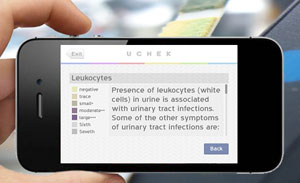A 29-year-old entrepreneur from India has developed a smartphone app that can analyze your urine for the presence of up to 10 markers covering 25 different medical conditions.
uChek is the brainchild of Myshkin Ingawale, who showed off his new invention at the TED (Technology, Education and Design) 2013 conference in Los Angeles this week.
App Analyzes Color of Urine-Dipped Chemical Strips
The app uses the smartphone’s camera to take photos of chemical strips that you dip in a sample of your urine. It then compares them to a color-coded map and within a few seconds reports the results, showing levels of glucose, bilirubin, proteins, ketones, leukocytes, and up to 5 other parameters in a chart that you can view on the screen of the smartphone.
The information is presented in an easy to understand format, using positive or negative results, or numbers, and you can click on keywords like “leukocytes” for further information.
The test results from uChek could help people managing diabetes, and also kidney, bladder and liver problems. They may also reveal a urinary tract infection.
The app also stores previous results, thus making it easy to monitor trends.
Currently In Testing, Soon to Be Available for IPhone, then Android
The app is currently undergoing testing in a Mumbai hospital and making its way through the Apple approval system.

Ingawale says he hopes it will soon be available on the iPhone, and after that, an Android version is also planned, although that will take a bit longer because of all the different types of cameras in Android smartphones.
In initial testing with 1,200 samples, Ingawale says the app delivered more accurate results than humans looking at the color-strips by eye.
With more expensive equipment the reading would be more accurate, but then you are talking about machines costing up to $10,000.
For a cost of 99 cents for the app, plus $20 for the packet of strips and a color-coded map, you can run uChek on your smartphone, says Ingawale, who emphasizes that the point of the app is not to diagnose disease but to make you, your friends, family, and even your doctor, better informed about health issues.
Revolutionizing Healthcare
uChek is not the first device that Ingawale has presented at TED. Last year he demonstrated a blood test that can be taken without drawing blood, that can help diagnose anemia. Called ToucHb, it uses LEDs and photodiodes to analyze the absorption pattern of hemoglobin.
Ingawale is keen to revolutionize the medical device industry, which he says operates on the idea of “proprietary, closed hardware and a recurring revenue business model”.
He says he wants to help people better understand what is happening in their own bodies. He told the BBC:
“I wanted to get medical health checks into users’ hands. There is huge potential to get the world of biochemistry out to users via apps.”
“I am trying to democratize healthcare,” he says, in a report published this week in Wired.com.
Ingawale’s apps are examples of a growing trend in personal electronic health that includes “self-tracking”, where computing tools such as wearable sensors and mobile apps collect, process and display a wealth of personal data to help you keep track of and manage all aspects of your health.
Throughout areas of medicine, applications on tablets and smartphones, and the iPad and iPhone in particular, are bringing about more than just an information revolution. In some hospitals, the demand for change from clinicians is so great, they have started developing their own apps.
However, while there are many good apps around, there are also many bad apps, and people are starting to push for regulation, in much the same way as drugs and medical devices are regulated.
For example, a recent review of smartphone apps where you can upload photos of skin lesions and have them analyzed for likelihood of cancer shows they can get it wrong an alarming number of times.
